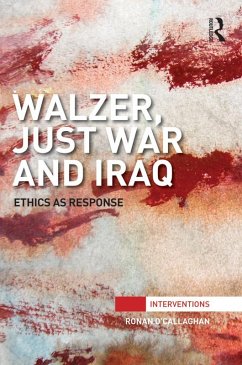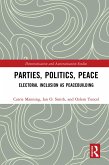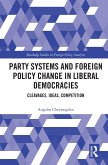42,95 €
42,95 €
inkl. MwSt.
Sofort per Download lieferbar

21 °P sammeln
42,95 €
Als Download kaufen

42,95 €
inkl. MwSt.
Sofort per Download lieferbar

21 °P sammeln
Jetzt verschenken
Alle Infos zum eBook verschenken
42,95 €
inkl. MwSt.
Sofort per Download lieferbar
Alle Infos zum eBook verschenken

21 °P sammeln
- Format: PDF
- Merkliste
- Auf die Merkliste
- Bewerten Bewerten
- Teilen
- Produkt teilen
- Produkterinnerung
- Produkterinnerung

Bitte loggen Sie sich zunächst in Ihr Kundenkonto ein oder registrieren Sie sich bei
bücher.de, um das eBook-Abo tolino select nutzen zu können.
Hier können Sie sich einloggen
Hier können Sie sich einloggen
Sie sind bereits eingeloggt. Klicken Sie auf 2. tolino select Abo, um fortzufahren.

Bitte loggen Sie sich zunächst in Ihr Kundenkonto ein oder registrieren Sie sich bei bücher.de, um das eBook-Abo tolino select nutzen zu können.
This book directly addresses the question of what it means to act ethically in times of war by drawing upon first-hand accounts of U.S. war fighting in Iraq during the 2003 invasion and occupation.
- Geräte: PC
- mit Kopierschutz
- eBook Hilfe
- Größe: 1.02MB
Andere Kunden interessierten sich auch für
![Parties, Politics, Peace (eBook, PDF) Parties, Politics, Peace (eBook, PDF)]() Carrie ManningParties, Politics, Peace (eBook, PDF)40,95 €
Carrie ManningParties, Politics, Peace (eBook, PDF)40,95 €!['Progress' in Zimbabwe? (eBook, PDF) 'Progress' in Zimbabwe? (eBook, PDF)]() 'Progress' in Zimbabwe? (eBook, PDF)34,95 €
'Progress' in Zimbabwe? (eBook, PDF)34,95 €![Global Ethics (eBook, PDF) Global Ethics (eBook, PDF)]() Mervyn FrostGlobal Ethics (eBook, PDF)40,95 €
Mervyn FrostGlobal Ethics (eBook, PDF)40,95 €![Party Systems and Foreign Policy Change in Liberal Democracies (eBook, PDF) Party Systems and Foreign Policy Change in Liberal Democracies (eBook, PDF)]() Angelos ChryssogelosParty Systems and Foreign Policy Change in Liberal Democracies (eBook, PDF)42,95 €
Angelos ChryssogelosParty Systems and Foreign Policy Change in Liberal Democracies (eBook, PDF)42,95 €![Ontological Entanglements, Agency and Ethics in International Relations (eBook, PDF) Ontological Entanglements, Agency and Ethics in International Relations (eBook, PDF)]() Laura ZanottiOntological Entanglements, Agency and Ethics in International Relations (eBook, PDF)45,95 €
Laura ZanottiOntological Entanglements, Agency and Ethics in International Relations (eBook, PDF)45,95 €![Personalist Rule in Africa and Other World Regions (eBook, PDF) Personalist Rule in Africa and Other World Regions (eBook, PDF)]() Jeroen J. J. van den BoschPersonalist Rule in Africa and Other World Regions (eBook, PDF)42,95 €
Jeroen J. J. van den BoschPersonalist Rule in Africa and Other World Regions (eBook, PDF)42,95 €![Democracy and Violence (eBook, PDF) Democracy and Violence (eBook, PDF)]() Democracy and Violence (eBook, PDF)48,95 €
Democracy and Violence (eBook, PDF)48,95 €-
-
-
This book directly addresses the question of what it means to act ethically in times of war by drawing upon first-hand accounts of U.S. war fighting in Iraq during the 2003 invasion and occupation.
Hinweis: Dieser Artikel kann nur an eine deutsche Lieferadresse ausgeliefert werden.
Dieser Download kann aus rechtlichen Gründen nur mit Rechnungsadresse in A, B, BG, CY, CZ, D, DK, EW, E, FIN, F, GR, HR, H, IRL, I, LT, L, LR, M, NL, PL, P, R, S, SLO, SK ausgeliefert werden.
Hinweis: Dieser Artikel kann nur an eine deutsche Lieferadresse ausgeliefert werden.
Produktdetails
- Produktdetails
- Verlag: Taylor & Francis eBooks
- Seitenzahl: 184
- Erscheinungstermin: 8. Oktober 2015
- Englisch
- ISBN-13: 9781317382430
- Artikelnr.: 43976442
- Verlag: Taylor & Francis eBooks
- Seitenzahl: 184
- Erscheinungstermin: 8. Oktober 2015
- Englisch
- ISBN-13: 9781317382430
- Artikelnr.: 43976442
- Herstellerkennzeichnung Die Herstellerinformationen sind derzeit nicht verfügbar.
Ronan O'Callaghan has recently completed his PhD in Politics at the University of Manchester. He is currently a Lecturer in International Relations at the University of Central Lancashire.
Chapter 1: Introduction. The Tower of Babel and the Ideal of Unity. Michael
Walzer and the Just War Tradition. Deconstruction as Methodology.
Historical Analysis and the Problem of Representation. With whom does the
historical writer of historicism actually empathise? Structure of the Book.
Conclusion Chapter 2: Morality, Community and the Justification of War.
Introduction. There is a Thin Man inside Every Fat Man. Self-determination
and Membership. Declaration and the Birth of Community. Membership and
Alterity. War and Maximal Morality. Temporal Revelation and Being.
Différance and Secular Theology. Conclusion Chapter 3: Violence, Ethics and
the Invasion of Iraq. A Brief History of Iraq. The Pre-War Imaging of
Justice in Iraq. Occupation and Legal Authority. Postwar Security.
De-Ba'athification and Sunni Resistance. Religious Authority and the Iraqi
Constitution. The 2005 Election and Ethno-Sectarian Violence. Conclusion
Chapter 4: Derrida and Ethics. Introduction. Ethics as first philosophy.
Community as the possibility of justice. Ethical Action as Sacrifice.
Undecidability as Justice for the Other. Conclusion Chapter 5:
Non-combatant Immunity and the Sacrifice of Rights. Introduction.
Identifying the Target. Combatant Rights. Justifying the Loss of Rights.
Simply by Fighting. Danger and Threat. Freedom and Sacrifice. Conclusion.
Chapter 6: Double Effect and its Parasites. Introduction. The Doctrine of
Double Effect. Pardon me for not Meaning to ... In All Good Faith. Policing
with Due Care. Deepening Double Effect. Siege Warfare: An Illustrative
Example. Conclusion: Ethics as Double Effect. Conclusion: Ethics as
Response. What the Hell is Water? Shattering Sisyphus. Responding to Iraqis
Walzer and the Just War Tradition. Deconstruction as Methodology.
Historical Analysis and the Problem of Representation. With whom does the
historical writer of historicism actually empathise? Structure of the Book.
Conclusion Chapter 2: Morality, Community and the Justification of War.
Introduction. There is a Thin Man inside Every Fat Man. Self-determination
and Membership. Declaration and the Birth of Community. Membership and
Alterity. War and Maximal Morality. Temporal Revelation and Being.
Différance and Secular Theology. Conclusion Chapter 3: Violence, Ethics and
the Invasion of Iraq. A Brief History of Iraq. The Pre-War Imaging of
Justice in Iraq. Occupation and Legal Authority. Postwar Security.
De-Ba'athification and Sunni Resistance. Religious Authority and the Iraqi
Constitution. The 2005 Election and Ethno-Sectarian Violence. Conclusion
Chapter 4: Derrida and Ethics. Introduction. Ethics as first philosophy.
Community as the possibility of justice. Ethical Action as Sacrifice.
Undecidability as Justice for the Other. Conclusion Chapter 5:
Non-combatant Immunity and the Sacrifice of Rights. Introduction.
Identifying the Target. Combatant Rights. Justifying the Loss of Rights.
Simply by Fighting. Danger and Threat. Freedom and Sacrifice. Conclusion.
Chapter 6: Double Effect and its Parasites. Introduction. The Doctrine of
Double Effect. Pardon me for not Meaning to ... In All Good Faith. Policing
with Due Care. Deepening Double Effect. Siege Warfare: An Illustrative
Example. Conclusion: Ethics as Double Effect. Conclusion: Ethics as
Response. What the Hell is Water? Shattering Sisyphus. Responding to Iraqis
Chapter 1: Introduction. The Tower of Babel and the Ideal of Unity. Michael
Walzer and the Just War Tradition. Deconstruction as Methodology.
Historical Analysis and the Problem of Representation. With whom does the
historical writer of historicism actually empathise? Structure of the Book.
Conclusion Chapter 2: Morality, Community and the Justification of War.
Introduction. There is a Thin Man inside Every Fat Man. Self-determination
and Membership. Declaration and the Birth of Community. Membership and
Alterity. War and Maximal Morality. Temporal Revelation and Being.
Différance and Secular Theology. Conclusion Chapter 3: Violence, Ethics and
the Invasion of Iraq. A Brief History of Iraq. The Pre-War Imaging of
Justice in Iraq. Occupation and Legal Authority. Postwar Security.
De-Ba'athification and Sunni Resistance. Religious Authority and the Iraqi
Constitution. The 2005 Election and Ethno-Sectarian Violence. Conclusion
Chapter 4: Derrida and Ethics. Introduction. Ethics as first philosophy.
Community as the possibility of justice. Ethical Action as Sacrifice.
Undecidability as Justice for the Other. Conclusion Chapter 5:
Non-combatant Immunity and the Sacrifice of Rights. Introduction.
Identifying the Target. Combatant Rights. Justifying the Loss of Rights.
Simply by Fighting. Danger and Threat. Freedom and Sacrifice. Conclusion.
Chapter 6: Double Effect and its Parasites. Introduction. The Doctrine of
Double Effect. Pardon me for not Meaning to ... In All Good Faith. Policing
with Due Care. Deepening Double Effect. Siege Warfare: An Illustrative
Example. Conclusion: Ethics as Double Effect. Conclusion: Ethics as
Response. What the Hell is Water? Shattering Sisyphus. Responding to Iraqis
Walzer and the Just War Tradition. Deconstruction as Methodology.
Historical Analysis and the Problem of Representation. With whom does the
historical writer of historicism actually empathise? Structure of the Book.
Conclusion Chapter 2: Morality, Community and the Justification of War.
Introduction. There is a Thin Man inside Every Fat Man. Self-determination
and Membership. Declaration and the Birth of Community. Membership and
Alterity. War and Maximal Morality. Temporal Revelation and Being.
Différance and Secular Theology. Conclusion Chapter 3: Violence, Ethics and
the Invasion of Iraq. A Brief History of Iraq. The Pre-War Imaging of
Justice in Iraq. Occupation and Legal Authority. Postwar Security.
De-Ba'athification and Sunni Resistance. Religious Authority and the Iraqi
Constitution. The 2005 Election and Ethno-Sectarian Violence. Conclusion
Chapter 4: Derrida and Ethics. Introduction. Ethics as first philosophy.
Community as the possibility of justice. Ethical Action as Sacrifice.
Undecidability as Justice for the Other. Conclusion Chapter 5:
Non-combatant Immunity and the Sacrifice of Rights. Introduction.
Identifying the Target. Combatant Rights. Justifying the Loss of Rights.
Simply by Fighting. Danger and Threat. Freedom and Sacrifice. Conclusion.
Chapter 6: Double Effect and its Parasites. Introduction. The Doctrine of
Double Effect. Pardon me for not Meaning to ... In All Good Faith. Policing
with Due Care. Deepening Double Effect. Siege Warfare: An Illustrative
Example. Conclusion: Ethics as Double Effect. Conclusion: Ethics as
Response. What the Hell is Water? Shattering Sisyphus. Responding to Iraqis







